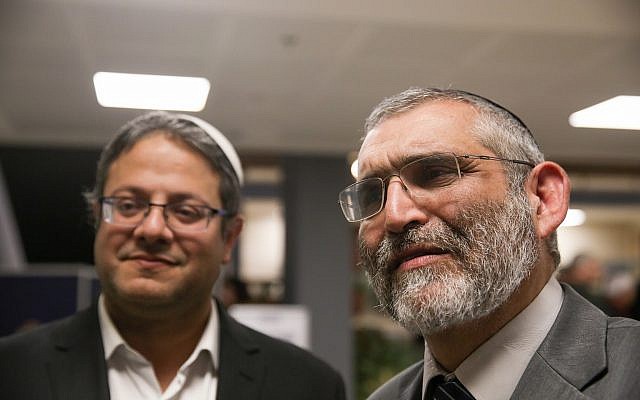Since last week’s inclusion of the Otzma Yehudit party in the political alliance between Bayit Yehudi and National Union, several prominent Israeli and Diaspora Jewish figures and institutions have issued hysterical statements about what the inclusion and legitimization of ultra-nationalist kahanists means for the future of the Jewish state.
The deal, brokered last week by Prime Minister Binyamin Netanyahu (Likud), gives Otzma the fifth and eighth seats on a unified block of national-religious parties running together in the upcoming elections to avoid small nationalist parties wasting votes by not passing the electoral threshold.
Following the April 9 elections, the factions plan to split and operate independently in order to allow Bayit Yehudi and National Union to enter Netanyahu’s new coalition while Otzma remains in opposition.
While it’s likely that Netanyahu actually plans to use this merger as an excuse to leave the entire national-religious block out of his next government in order to ease the acceptance and implementation of United States President Donald Trump’s plan to divide the country into two states, the prime minister has offered Bayit Yehudi and National Union two significant ministerial portfolios, as well as two seats on the security cabinet, in exchange for taking Otzma as part of their block.
One commitment Netanyahu made that he cannot renege on at this point is to secure the 28th place on his Likud party’s Knesset list for Deputy Defense Minister Rabbi Eli ben-Dahan (Bayit Yehudi) in order to compensate the national-religious block for votes the slate will likely lose as a result of including kahanists on their list.
There has already been a public outcry within Bayit Yehudi over the Otzma deal and several prominent figures have left the party as a result, expressing the same outrage as many Israeli and Diaspora Jews.
On Friday, the American Israel Public Affairs Committee (AIPAC) retweeted a statement by the American Jewish Committee (AJC) against the Otzma deal, adding that “We agree with AJC. AIPAC has a longstanding policy not to meet with members of this racist and reprehensible party.”
The AJC had come out against the merger on Thursday, saying that “The views of Otzma Yehudit are reprehensible. They do not reflect the core values that are the very foundation of the State of Israel. The party might conceivably gain enough votes to enter the next Knesset, and potentially even become part of the governing coalition.”
“Historically, the views of extremist parties, reflecting the extreme left or the extreme right, have been firmly rejected by mainstream parties, even if the electoral process of Israel’s robust democracy has enabled their presence, however small, in the Knesset.”
Both AIPAC and the AJC were immediately criticized on social media for not mentioning the fact that it was actually Prime Minister Netanyahu who pushed for Otzma’s inclusion in the next Knesset. In fact, many saw the carefully worded statements as mere attempts by America’s pro-Israel Jewish establishment to show itself capable of criticizing Israel under the right circumstances.
But even the harsher statements targeting Netanyahu have missed the mark. Accusing the prime minister of offering political legitimacy to kahanists in order to hold onto power might play well during an election cycle but it ignores the fact that the kahanists were actually legitimized a long time ago.
Barukh Marzel, who served as Rabbi Meir Kahane’s personal parliamentary aid during the 1980s, had been permitted to run for Knesset by Israel’s national election committee back in 2003. Fellow Otzma candidate Michael ben-Ari already served as a National Union lawmaker from 2009-2012.
Since the years of the second intifada, when “Kahane was Right” graffiti began to appear throughout the country, tens of thousands of Israelis have voted for kahanists in every election. Otzma clearly has an electoral base seeking representation.
At the end of the day, the kahanists of Otzma aren’t going to influence policy or contribute anything beyond some political theater from the opposition. Their threat to the image and soul of Israeli society is likely to be negligible. But they’re low hanging fruit and an easy target for Israeli and pro-Israel Diaspora Jews concerned that the Jewish state is moving too far from the values of its ruling class.
Otzma represents the ugliest expression of Israel’s more tribalist and traditional forces gaining power at the expense of the state’s westernized ruling class. When it comes to the broader culture war between forces of Western liberalism and Jewish nationalism, Israel’s fear-mongering elites rarely miss an opportunity to use kahanists as a caricature to delegitimize the entire camp seeking to strengthen the state’s Jewish character and maintain Israeli control of the West Bank.
But what’s most problematic about Otzma is a feature its members actually share in common with both sides of Israel’s ideological and socio-cultural divide.
More alarming than Otzma’s hostile anti-Palestinian rhetoric or whether or not the party makes it into Knesset is the fact that the kahanists share most of Israeli society’s perception of the Palestinians as an unwanted population that’s part of a much larger enemy collective.
But unlike most Israeli parties, from Meretz to National Union, Otzma follows this perception to its logical conclusions. If Palestinians really are simply the spearhead of broader Arab and/or Islamic efforts to annihilate the State of Israel, it might even make sense to advocate for kahanist policies.
But this perception, shared by the vast majority of Israeli society, superimposes identities and ideologies on Palestinians completely out of step with how they experience themselves. The real issue isn’t Otzma but rather that Israeli society as a collective fully ignores and dismisses how Palestinians have experienced the last hundred years and the ways in which they feel victimized by Zionism.
Scapegoating Otzma prevents us from dealing with some very deep problems in Israeli society – namely how we as a collective relate to Palestinians. The answer isn’t to silence and delegitimize anyone willing to advocate discriminatory or violent policies against a population nearly all of Israeli society views as unwanted antagonists but rather to change the roles Palestinians and Israelis play in each other’s larger national stories.
If Israelis and Palestinians could successfully engage each other’s narratives without fear and make an effort to truly understand the values, grievances and aspirations of the other side, the kahanists of Otzma might actually be among the first Israelis to find common cause with Palestinian activists on many issues currently confronting both peoples.






Their problem with Otzma is that they are too Jewish for them. They stand up for Jewish rights which are trampled in Israel by the government. They also care about Jewish lives and want to use real solutions to reduce terrorism and deal with terrorists and those who aid and abet them harshly and not use band aid solution. This is the problem many on the left and te fake right have with Otzma.